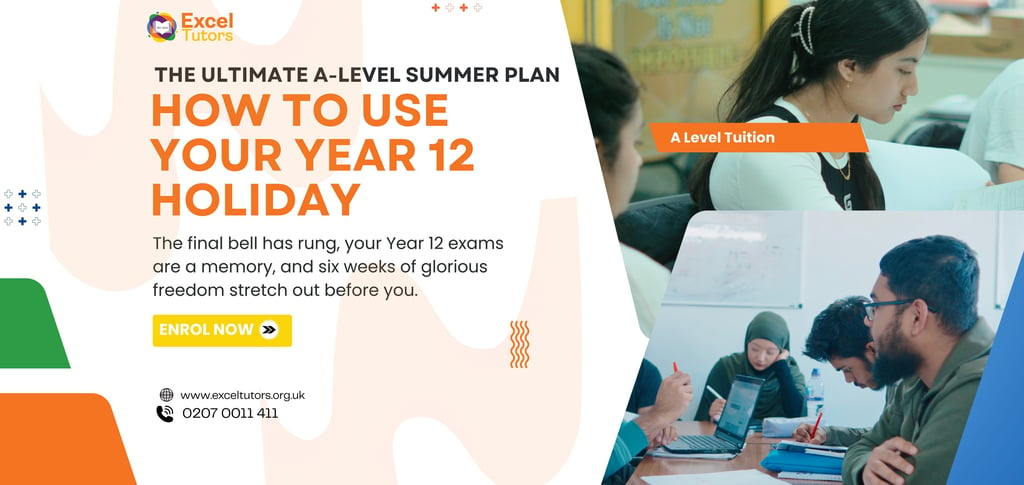The Ultimate A-Level Summer Plan | How to Use Your Year 12 Holiday
The Ultimate A-Level Summer Plan | How to Use Your Year 12 Holiday
TUITION
Eman Ahamed
7/23/20254 min read


The Ultimate A-Level Summer Plan: How to Win the Holiday Before Year 13
The final bell has rung, your Year 12 exams are a memory, and six weeks of glorious freedom stretch out before you. The temptation to switch off completely is huge, and let's be clear: you've earned a serious break. But the long summer holiday between Year 12 and Year 13 isn't just an ending; it's the single most important runway you have for launching into a successful final year and a winning university application.
As we head into late July, it’s the perfect moment to think about a plan. Not a rigid, minute-by-minute schedule that drains the joy from your holiday, but a smart strategy that balances rest with purposeful preparation. Getting this balance right is the secret to returning in September feeling refreshed, confident, and miles ahead of the competition.
Here’s how to make your A-Level summer holiday count.
The Golden Rule: Balance is Everything
First thing's first: avoid the two extremes. Don't spend the entire summer glued to revision notes until you burn out, and don't let it drift by in a six-week Netflix haze. The goal is productive relaxation.
Schedule in proper downtime. See your friends, go on holiday, sleep in. A rested brain is a prerequisite for the challenges of Year 13. Think of this break as a strategic pit stop, not a complete shutdown.
Laying the Foundations: Your UCAS Application
This is your number one priority. The students who walk into Year 13 with a half-finished UCAS application are calm and focused. The ones who haven't started are already stressed. Use the summer to get ahead.
1. Finalise Your University & Course Choices
You've probably done some research, but now is the time to get specific. Go beyond league tables and dig into:
Course Modules: What will you actually be studying in your first and second year? Do the topics genuinely excite you?
Entry Requirements: Are your predicted grades realistic? Do you need specific subjects or grades you hadn't considered?
Campus vs. City: What kind of student life are you looking for? Watch virtual tours and read student reviews.
2. Craft Your Personal Statement Draft
Your personal statement is your voice in the application process. It takes time to get right, and the summer provides the perfect space for reflection without the pressure of school.
Brainstorm: Start a document and just list everything you've done that's relevant. Your subjects, any work experience, books you've read, documentaries you’ve watched, clubs you’re in. No filter, just get it all down.
Find Your 'Why': Why do you want to study this subject? This is the core of your statement. Find a compelling narrative that links your experiences to your academic ambition.
Draft, Don't Perfect: The goal is not to have a finished masterpiece by September. It's to have a strong, well-structured first draft that your teachers or tutors can help you refine. Aim for 70-80% complete.
Build Your Profile: Experience & Super-curriculars
Admissions tutors want to see evidence of your passion for a subject beyond the A-Level syllabus. The summer is your prime opportunity to gather this evidence.
3. Get Relevant Experience
Work experience shows commitment and gives you tangible things to write about in your personal statement.
Work Experience/Shadowing: If you want to study medicine, law, or engineering, trying to get even a few days of shadowing is invaluable.
Volunteering: This demonstrates character and valuable soft skills. It could be for a local charity, a care home, or an environmental project.
Part-time Job: Any job teaches responsibility, time management, and communication. It's all relevant experience for life and your application.
4. Go Super-curricular
This means exploring your chosen subject independently. It’s what truly impressive candidates do.
For STEM students: Try an online course on FutureLearn or Coursera, work on a coding project, or read publications like New Scientist.
For Humanities/Arts students: Dive into further reading from university reading lists (many are available online), visit museums or galleries in London, or watch relevant lectures on YouTube.
For Social Sciences students: Read The Economist, follow relevant think tanks, or listen to podcasts discussing current affairs related to your subject (e.g., politics, sociology).
Speaking of super-curriculars that make a real impact, consider gaining a skill that will set you apart both on your UCAS application and in your future degree. For students aiming for competitive courses like Economics, Business, Finance, Engineering, or the Sciences, advanced proficiency in Microsoft Excel is a huge advantage. It demonstrates strong analytical and quantitative skills that admissions tutors love. This is where Excel Tutors can give you a significant edge. Our expert, one-to-one online tutoring can take you from a complete beginner to a confident user, ready to tackle university-level data analysis. Mentioning this on your personal statement isn't just a talking point—it's proof of your proactive preparation for higher education.
Consolidate & Look Ahead: Smart Revision
The phrase 'summer revision' can sound depressing, but this isn't about re-learning everything. This is a strategic tune-up.
Plug Your Year 12 Gaps: Be honest with yourself. Which topics did you struggle with in the mocks? Spend just 2-3 hours a week reviewing these specific areas. Use flashcards or make summary notes. This will pay huge dividends when the content is built upon in Year 13.
Read Ahead (lightly): If you're feeling confident, have a quick look at the first few topics for Year 13. You don't need to master them, but familiarising yourself with the key concepts will prevent that "first-day-back" information overload.
Your Simple Summer Action Plan
Feeling overwhelmed? Don't be. Here’s a simple timeline:
Late July: Decompress. Enjoy your freedom. Start your UCAS research in a low-pressure way.
Early August: Deep dive into course choices. Start brainstorming your personal statement and reach out for work experience opportunities.
Mid-August: Write the first draft of your personal statement. Do your super-curricular activities. Start your light revision of tricky Year 12 topics.
Late August / Early September: Refine your personal statement. Get a head start on Year 13 reading. Enjoy the last of the sunshine and recharge for the year ahead.
This summer is a unique opportunity. By using it wisely, you can transform the daunting prospect of Year 13 into a challenge you are fully equipped to meet. This isn't about pressure; it's about preparation and unlocking your potential. Now go and enjoy it.
Subscribe to our newsletter
Excel Tutors
Empowering young learners to achieve academic excellence through tuition.
Excel Tutors is a Limited Company in England and Wales with registration number 07417709.
© 2026. All rights reserved by Excel Tutors.
Designed, Developed and Maintained By Blueprint Design Lab
